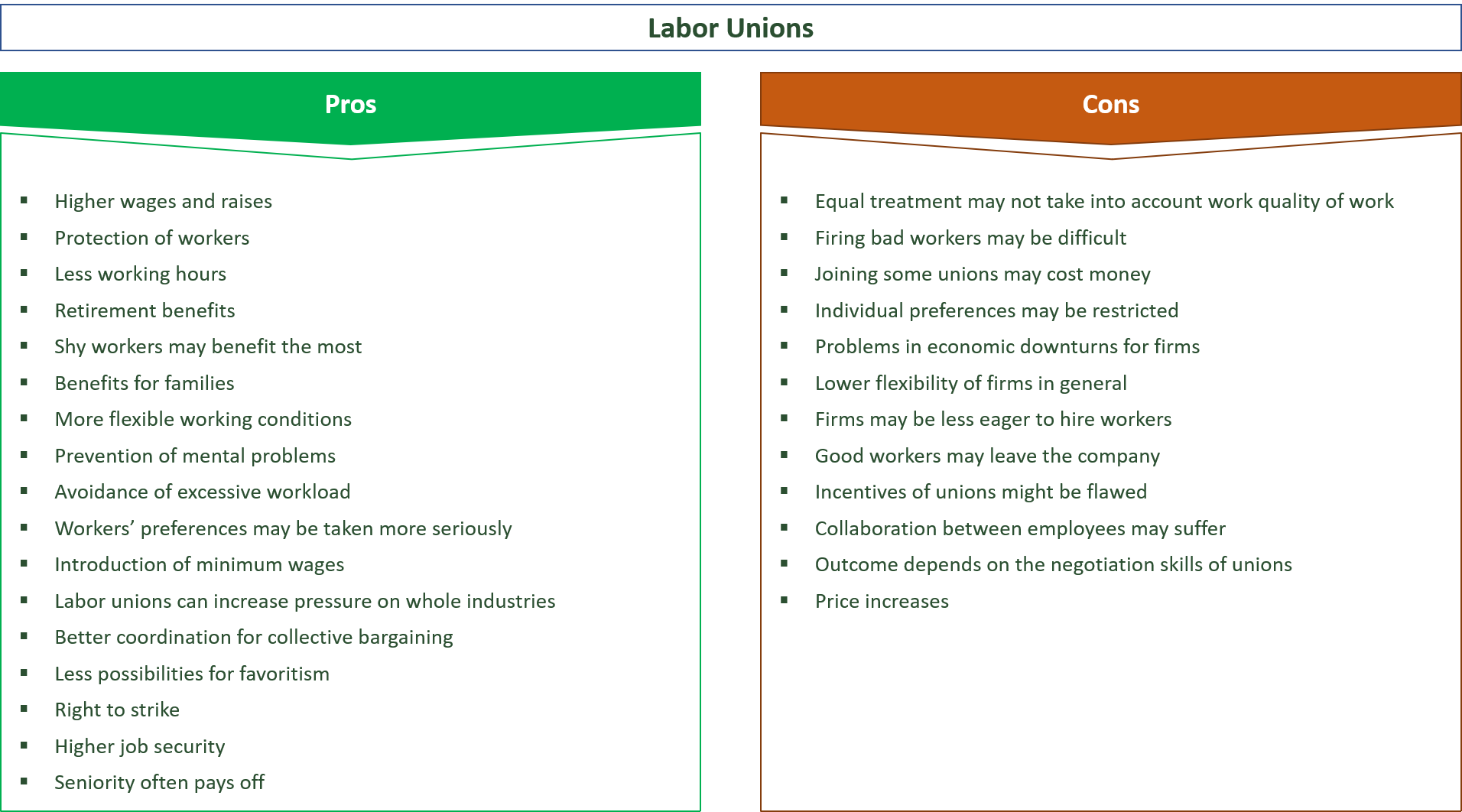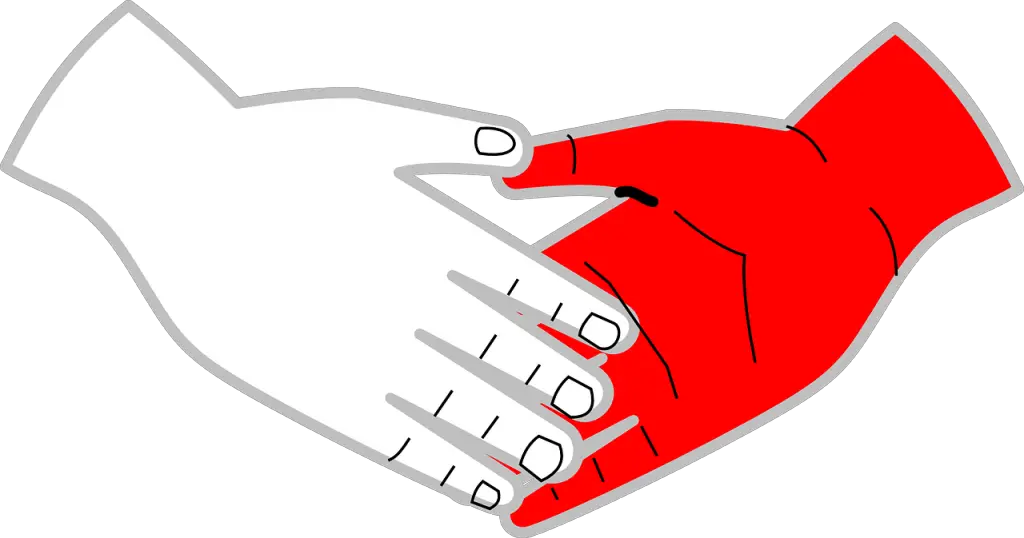“Private sector labors unions continue to suffer losses in their membership while public sector and service unions grow.”
Thomas E. Mann, Sociologist
Advantages & Disadvantages of Labor Unions

Labor unions (sometimes also referred to as trade unions or simply unions) are organizations that try to represent the workers’ preferences through collective bargaining in the job market.
They usually try to improve the overall working conditions, including higher wages and other benefits.
Although labor unions have many important advantages, they also imply some downsides.
In this article, the pros and cons of labor unions are examined.
Audio Lesson
Contents
Advantages of Unions
- Higher wages and raises
- Protection of workers
- Less working hours
- Retirement benefits
- Shy workers may benefit the most
- Benefits for families
- More flexible working conditions
- Prevention of mental problems
- Avoidance of excessive workload
- Workers’ preferences may be taken more seriously
- Introduction of minimum wages
- Labor unions can increase pressure on whole industries
- Better coordination for collective bargaining
- Fewer possibilities for favoritism
- Right to strike
- Higher job security
- Seniority often pays off
Higher wages and raises
One important advantage of labor unions is that they can often arrange higher wages and higher raises on average compared to individuals.
Thus, if you are a member of a union, chances are that you will benefit from a decent wage in the long run.
This is especially true in industry branches where the wages are generally rather low.
In these sectors, labor unions can make a big difference by negotiating higher wages.
Protection of workers
Trade unions also have strict standards regarding the safety of workers.
For instance, there have to be certain minimum safety standards when working in sectors that may imply serious dangers.
In those sectors, labor unions may negotiate safety standards that are significantly above the minimum standards set by law.
Thus, also from a safety perspective, joining labor unions can make quite a lot of sense.
Less working hours
In general, labor unions often also try to improve the working conditions of employees as much as possible.
This also includes reducing the number of working hours per week.
In the past decades, our ancestors often worked pretty long hours since there had been no organizations to protect them against exploitation.
However, in our current society, labor unions can negotiate strict limits for working hours, which may significantly benefit workers since they will have more leisure and more time to spend with their kids.
Retirement benefits
Another upside of unions is that they also negotiate retirement benefits for workers.
It is important to have an expert in this kind of field to lead negotiations since workers often can’t figure out whether the retirement benefits offered by a firm are decent or not.
Thus, with a skilled trade union leader, better retirement benefits could be accomplished and fewer people may have to suffer from poverty once they retire.
Shy workers may benefit the most
In general, labor unions become most important for workers who have not learned to stand up for themselves.
This is often true for shy people since they are often afraid to speak up since they fear the consequences.
Thus, especially for shy workers who are not able to negotiate a decent raise or other benefits, labor unions can be great since they will do most of the negotiations and the overall working conditions for shy people may increase significantly.
Benefits for families
Labor unions can not only accomplish better working conditions for employees, also the families of workers may experience important benefits.
For instance, this could include better health insurance or social security.
It could also mean providing the family with a place in a kindergarten so that the parent can focus on this job and can improve his quality of work.
Thus, apart from financial benefits for the worker who joined a labor union, there might also be several benefits for his or her whole family.
More flexible working conditions
Flexibility is a thing that many workers urgently want to have, however, in many firms, there are still quite strict schedules and the level of flexibility is still quite low.
Thus, labor unions could also improve the working conditions in this regard by negotiating more flexible working conditions.
This could mean to giving employees the opportunity to work from home or to give them flexibility regarding when they want to start to work.
Through this higher level of flexibility, parents would be better able to manage their work and their private life.
Prevention of mental problems
Many people feel quite stressed in their job, which may also lead to the development of mental health issues.
This may be due to working long hours or also since the working conditions in certain firms are quite poor.
Trade unions could mitigate this issue to a certain extent by introducing employee protection standards which aim to reduce the stress levels of workers in order to prevent mental problems.
Avoidance of excessive workload
In some sectors, the workload for employees can be enormous.
Many employees are often simply overwhelmed by all the tasks they are meant to carry out.
Therefore, many people complain about excessive workload and the related mental burden.
However, many employees are scared to talk to their boss regarding the workload problem.
Thus, labor unions may also be a great help in this regard since their aim will be to protect workers from excessive workload.
Workers’ preferences may be taken more seriously
Many companies also claim that they respect workers’ rights and that they want to improve overall working conditions.
However, at the same time, those firms often do not deliver what they promised.
Thus, by organizing in a labor union, workers will have much more power and the wishes of workers will be taken more seriously by company leaders.
Therefore, especially in companies where the opinion of individuals doesn’t seem to matter, trade unions can give them a collective voice in order to improve the overall working conditions.
Introduction of minimum wages
Labor unions can also play an important role when it comes to the introduction of minimum wages.
In some sectors, companies often fight against minimum wages and it would be almost impossible for workers to accomplish a minimum wage.
However, through powerful labor unions, negotiations regarding minimum wages are much more promising and labor unions had been quite successful in the past regarding the implementation of minimum wages.
Therefore, especially in branches that are known to pay quite low wages, the introduction of minimum wages through labor unions could be quite beneficial for many workers.
Labor unions can increase pressure on whole industries
Unions are quite well organized and can therefore increase the pressure on whole industries or even across industries.
For instance, if a labor union accomplishes certain benefits for workers in one industry, companies in other industry branches may be forced to give their employees similar benefits since they fear to lose their workers otherwise.
Thus, labor unions could be quite powerful when it comes to improvements in working conditions in many different industries.
Better coordination for collective bargaining
On an individual basis, company leaders will often have far sophisticated negotiation skills and could therefore easily exploit workers through low wages and bad working conditions.
However, contrary to that, labor unions have many experts who know how to negotiate and will accomplish much better wages and other benefits on average.
Thus, especially for people with rather low negotiation skills, trade unions can be a great way to improve the outcome of negotiations for workers.
Fewer possibilities for favoritism
In many companies, the success of an individual not only depends on his or her quality of work, it is also heavily dependent on personal preferences and people are often promoted due to favoritism.
This can be regarded to be quite unfair since the quality of work should be more important than personal connections.
Labor unions can mitigate this problem to a certain extent since may set stricter rules for promotions which include objective factors like the seniority of people, which makes it less likely that unexperienced employees get promoted solely due to good connections.
Right to strike
Labor unions may also assure the right to strike for employees.
In some regions of our planet, striking is not yet an official right and people may lose their jobs if they engage in strikes.
Thus, especially in those areas, labor unions are quite important since they can assure that people don’t get fired if they engage in strikes in order to improve their working conditions.
Higher job security
Trade unions will often also try to secure as many jobs as possible.
For instance, some companies may plan to lay off workers and replace them with machines instead.
However, labor unions may negotiate strict rules with companies which may prevent those companies to lay off workers in some cases.
Thus, labor unions can also assure higher job security for many people.
Seniority often pays off
In branches where labor unions have plenty of power, there are also strict rules regarding the firing of workers.
For example, while inexperienced employees who have been employed just a short period of time ago will be at great risk to lose their jobs, senior employees will not have to fear losing their job since they will often be protected by labor unions.
This could be regarded to be kind of fair since senior employees showed a high level of identification with the firm in the past and should therefore also be protected against layoffs.

Disadvantages of Trade Unions
- Equal treatment may not take into account quality of work
- Firing bad workers may be difficult
- Joining some unions may cost money
- Individual preferences may be restricted
- Problems in economic downturns for firms
- Lower flexibility of firms in general
- Firms may be less eager to hire workers
- Good workers may leave the company
- Incentives of unions might be flawed
- Collaboration between employees may suffer
- Outcome depends on the negotiation skills of unions
- Price increases
Equal treatment may not take into account quality of work
Although trade unions have some important advantages, there are also some problems related to it.
For example, since all employees of a company are treated quite equally in terms of wages, raises and other benefits, the quality of work of individuals may not be taken into account sufficiently when it comes to raises or promotions.
This may give employees a flawed incentive to reduce their quality of work and to be less ambitious since they know that it doesn’t matter too much if they don’t use their full potential.
In turn, this may hurt companies in the long run since they may suffer from a loss in productivity.
Firing bad workers may be difficult
It may also be quite difficult for companies to get rid of bad workers since the standards and requirements regarding layoffs may simply be too high.
For instance, if an employee has worked for a company for many years and his quality of work suddenly drops due to a lack of motivation or due to other issues, chances are that the company will not be able to fire this worker since agreements with labor unions may prevent this due to the worker’s seniority.
Thus, companies may have a quite hard time to defend against employees who try to exploit the firms over time.
Joining some unions may cost money
Depending on the region you are living, joining labor unions might also cost significant amounts of money.
In some regions, even a few percent of your total yearly salary has to be spent on getting the benefits associated with labor unions.
Especially in those regions, workers should really ask themselves if they want to join those unions or if they want to rather work for a company where they can negotiate their wages themselves in order to avoid the costs for labor unions.
Individual preferences may be restricted
Even though the overall wage levels in a company as well as the overall working conditions may improve through the engagement of labor unions, this doesn’t mean that labor unions will improve the conditions of every worker.
For instance, workers who deliver quite good quality work will be restricted in their negotiations since they might have been able to get a much higher raise through individual negotiations without labor unions.
Thus, some workers might actually lose from actions of labor unions.
Problems in economic downturns for firms
Especially in times of financial distress and financial crisis situations, the agreements with labor unions may become a big problem for companies since they may not be able to lay off enough workers.
In the worst case, some companies may even go bankrupt due to that.
Thus, labor unions should allow for some sort of exception for the case of financial crisis situations since some companies may go bankrupt otherwise and many workers might lose their jobs if the rules are too strict in those crisis situations.
Lower flexibility of firms in general
Labor unions will often also restrict the level of flexibility of firms.
This could mean that firms will no longer be allowed to lay off workers or that they also have to improve the working conditions through costly measures.
All those things may restrict the level of freedom of firms and may lead to a loss of competitiveness.
This will be especially true for markets with high levels of global competition since in some countries, there are quite poor working conditions and firms in those countries will be able to get a competitive advantage over firms who were forced into quite strict working conditions with labor unions.
Firms may be less eager to hire workers
In general, if there are quite strong labor unions in place, chances are that firms are less likely to hire new workers since they know that they might not be able to get rid of those workers, even if they will only deliver poor working results.
Thus, especially young people may have problems finding a job and the unemployment rate for young people may be quite high due to that in industries with a strict presence of labor unions.
Good workers may leave the company
There is also a risk that workers who are quite engaged and deliver a good quality of work may sooner or later leave the company since they feel that their efforts will not pay off due to the interventions of labor unions.
For instance, imagine you work in a company and your results are much better than the results of most of your colleagues.
However, when it comes to raises, everyone gets almost the same amount of money.
I guess you would not be too happy about it, would you?!
Incentives of unions might be flawed
There may also be some risk that union leaders may collaborate with industry leaders and that the outcome for employees may be quite poor.
Thus, in such a case, workers might be far better off without the interventions of unions by negotiating their wages and other benefits by themselves rather to give away control to labor unions.
Collaboration between employees may suffer
Since a good quality of work will often not be rewarded in a sufficient manner if labor unions negotiated the framework with companies, there might be plenty of tensions between employees since workers who are really committed will become increasingly frustrated over time since their efforts will not pay off sufficiently.
Outcome depends on the negotiation skills of unions
Whether labor unions are beneficial for workers also significantly depends on the negotiation skills of union leaders.
If those union leaders are quite experienced, they will be able to negotiate quite good deals for employees.
However, if those union leaders don’t have sufficient expertise in the respective industry, chances are that the outcomes for workers will be quite poor.
Price increases
Since wages often increase due to the engagement of labor unions, also the prices of products tend to increase since companies often react to this increase in labor costs.
Thus, this may hurt the general public who will now be able to consume fewer material goods due to this price increase.
Therefore, even though the effect of labor unions for some workers might be positive, other people might suffer due to increasing prices.

Top 10 Labor Union Pros & Cons – Summary List
| Labor Union Pros | Labor Union Cons |
|---|---|
| Less working hours | Individual preferences may suffer |
| Higher average salary | Good work is not compensated sufficiently |
| Better protection of workers | Problems for firms to lay off bad workers |
| Family benefits | Problematic in financial crisis times |
| Reduction of workload | Firms may refrain from hiring new workers |
| Less mental issues | Lower level of flexibility for firms |
| Higher flexibility for workers | Flawed incentives of unions |
| Pension benefits | Firms may lose competitive advantage |
| Especially good for shy people | Joining unions may cost money |
| Minimum wages | Increase in prices |
Conclusion
Labor unions may be able to accomplish better working conditions in many industries and may therefore be quite beneficial to improve the overall quality of life for many employees.
However, there are also many issues related to trade unions.
Depending on the industry and the current working conditions, the true effect of engagements of labor unions can greatly vary and it will be unclear in many cases whether labor unions make sense until proven otherwise.
Sources
https://en.wikipedia.org/wiki/Labor_unions_in_the_United_States
https://en.wikipedia.org/wiki/Trade_union
https://www.britannica.com/topic/trade-union

About the author
My name is Andreas and my mission is to educate people of all ages about our environmental problems and how everyone can make a contribution to mitigate these issues.
As I went to university and got my Master’s degree in Economics, I did plenty of research in the field of Development Economics.
After finishing university, I traveled around the world. From this time on, I wanted to make a contribution to ensure a livable future for the next generations in every part of our beautiful planet.
Wanna make a contribution to save our environment? Share it!
